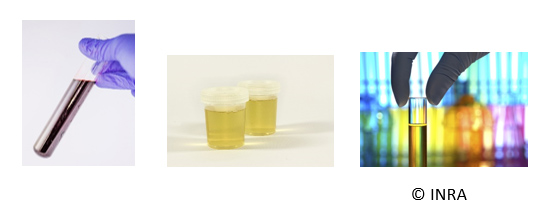Our laboratories have the expertise and knowledge for the sample preparation and data acquisition from a wide range of biological matrices (plants, microorganisms, human cells, tissues and biofluids animals).
Here are the privileged fields of application of the four platforms MetaboHUB:
Deciphering the metabolome is a key step today to many strategic fields of interest::Health, clinical research and medicine :
One of the most important challenges of today medicine is to understand and highlight interactions between genetic variations and environmental factors such as lifestyle, nutrition, infections, or exposure to pollutants, for biomarker discovery. Metabolomics helps understanding these interactions; Metabolomic studies will pave the way to personalized medicine – i.e. matching the right drug to the right patient at the right time - for safer drugs and improved healthcare.Food and human nutrition :
Human metabolism changes with age, the composition of the intestinal microbiota and lifestyle. By studying all the metabolites, metabolomics contributes to characterize a phenotype that integrates both genotype and external factors such as diet and its impact on the individual’s health status. It provides an excellent opportunity to evaluate the metabolic response to diets. Furthermore, metabolomics is remarkably suited to the development of a new generation of complex biomarkers integrating the diverse metabolic pathways that may be involved in a malfunction or an overall response to food in a network of metabolites. It can effectively participate to the description of the overall effects of nutrients on different physiological functions and to the objective characterization of nutritional status or of the dietary habits of subpopulations.Metabolomics is therefore a very informative approach for a data integration strategy and a relevant tool for studying the complexity of the relationship between diet and health;

Agroscience, plant biology and green biotechnology :
Metabolomics is crucial to fully comprehend the responses of plants to genetic modifications or environmental stresses. Outcomes are expected in breeding, improvement of agricultural practices, green chemistry and biotechnologies;
Microbiology and white biotechnologies:
Metabolomics is a key field of investigation for the comprehension of biological systems. MetaboHUB will provide standardized metabolomics data to improve their integration with proteomics, transcriptomics information and support systems biology. MetaboHUB will support white biotechnology (industrial biotechnology), and most particularly ‘Synthetic biology’ studies in order to develop advanced strategies for the (re)design and implementation of novel enzymes and novel metabolic pathways with desired properties;
Toxicology and environment :
These research areas mainly concern topics related to the impact of agents from artificial (chemical pollutants) or natural origin on living systems, at local or global levels. In both cases, metabolomics is a powerful tool for providing information from disturbances (biotic or abiotic stress) of living systems, which can be linked to other types of information (biochemical, other “omics”, epidemiological,…). Extension to meta-metabolomics, achieved on a complex set of synergistic biological systems, represents one of the challenges in these domains, particularly in the case of ecosystems.At the local level (e.g. living organism, microcosm, biotope) metabolomics allows a better understanding of the impact of contaminants (pesticides, mycotoxins and other disruptors occurring in environment or in food) on the equilibrium of the concerned system (homeostasy, health, biodiversity…). Therefore, the identification of early biomarkers (xenobiotics or endogenous) of exposure or effect allows considering a predictive dimension regarding the long term effects of exposure. At a more global level, (meta)metabolomics ensures a large coverage of the effects of changes (stress) at the community or ecosystem scale. Markers reflecting subtle modifications of exposure conditions in relation to societal or climatic evolutions can thus be sought in all environmental compartments (soil, water, and atmosphere).
